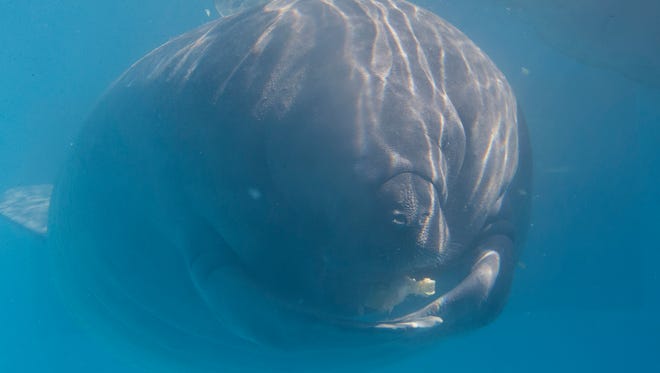Feds to reclassify manatees from 'endangered' to 'threatened'

Within a year, federal wildlife officials plan to reclassify the long-embattled Florida manatee from "endangered" to the less serious status of "threatened."
The U.S. Fish and Wildlife Service plans to publish a proposed rule to reclassify the species. The public would then have 90 days to weigh in on the change. Then the service expects to publish the final rule to reclassify within a year.
"Based on the best available scientific information, we believe the manatee is no longer in danger of extinction," Michael Oetker, deputy regional director for the U.S. Fish and Wildlife, said at a news conference Thursday at Miami Seaquarium.
The announcement comes after decades of studies and debate over whether Florida's most iconic creature should drop a peg from "endangered," a status the marine mammal has held since America's original list of endangered species was created in 1967.
"Endangered" means the species is at risk of going extinct. "Threatened" means they no longer are at imminent risk of extinction but could become so in the foreseeable future.
Wildlife officials took on a celebratory tone during Thursday's announcement, while assuring the change wouldn't dismantle slow-speed zones or lessen other manatee protections. But conservationists worry the reclassification would slide the manatee down a slippery slope of deregulation that would eventually gut vital protections before serious threats to the species have been addressed.
It's unclear what exactly the status change will mean, as boating and manatee advocacy groups continue to clash over what the rules on Florida's waters should be.
The manatee's listing status governs how state and federal and state agencies handle boating speed limits, dock and dredging permits and access to areas manatees frequent.
The Florida Fish and Wildlife Conservation Commission posted most of Brevard's manatee zones in the early 1990s, late 2002 and early 2003. The zones now cover 83 square miles — about a third — of the Indian River Lagoon and its tributaries in Brevard.
The zones require boats to go slow enough to prevent excessive wake, about 5 mph to 7 mph for most vessels.
Boaters face a $92 ticket for speeding through the zones.
FWC officials expressed support for the reclassification.
Beyond the Endangered Species Act, manatees receive additional protections under the Marine Mammal Protection Act, making it difficult to undo boating, permitting and other rules that protect them, federal officials said.